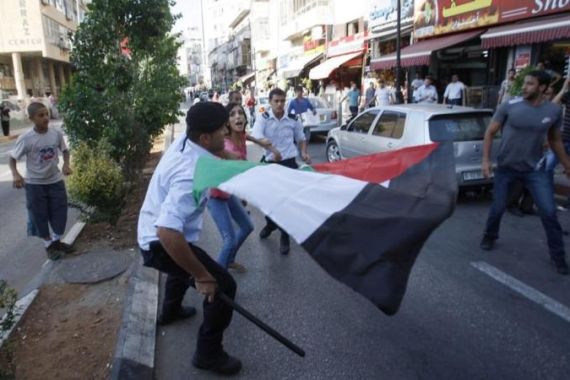Ramallah: Breaking bones, breaking trust
Violence used by police against protesters will further the growing discontent with the Palestinian Authority.

Something deep and painful was broken in Ramallah last Saturday. Along with the bones broken by violent Palestinian plainclothes officers and security officials dealing with the protest, Palestinian trust was permanently wounded.
The protests were called for by non-partisan youth protesting the intended, unprecedented visit by the Israeli vice-prime minister, Shaul Mofaz, to Ramallah. Palestinian protesters made a strong argument for their opposition to the Mofaz visit. They explained that Mofaz was not permitted to travel to many countries around the world because of his alleged role in war crimes against Palestinians, including the killings in Jenin and the crimes that took place during the Israeli army’s reoccupation of major West Bank cities in 2002. Mofaz has been accused of being behind the assassinations of PFLP leader Mustafa Abu Ali and Hamas’ handicapped leader Ahmad Yassin, and the imprisoning of Fatah leader Marwan Barghouti.
The Mofaz visit was eventually called off, but the demonstration continued and was met with a violent crackdown. It is unclear why the visit was cancelled. Israeli media talked about conflicts within the Israeli government, while Palestinian leaders tried to take credit for the cancellation.
Regardless of the reason, the violent attacks against protesters were reminiscent of images of the Arab Spring. The acts of plainclothes security under the eyes of the head of the Ramallah police reminded many of similar attempts by thugs and shabiha in various Arab countries.
The scores of injuries in the July 1 demonstration triggered a second demonstration the following day, in protest at the crackdown, and again Palestinian security forces used violence to prevent hundreds of demonstrators from reaching the Palestinian Authority’s Muqata headquarters.
While the successive crackdowns received minor coverage in the Palestinian press and some of the most-read websites, the news and pictures of Palestinian violence trended on social media. To her credit, PLO executive committee member Hanan Ashrawi was among the first to publicly denounce the violence against nonviolent protesters.
It took Palestinian human rights organisations and civil society groups a few days to gather the evidence and issue a strong statement of disapproval.
Eventually the Palestinian minister of interior issued a statement saying that an investigation would be conducted into what happened. Few Palestinians trust such statements, based on previous promised investigations that either never took place or whose results were not made public.
Changing political landscape
|
“If the demands and aspirations of these protesters are not taken seriously, the very foundation and legitimacy of the current Palestinian leadership will be seriously put to test.” |
The Palestinian leadership’s apparent impunity inflamed its opponents’ attacks, who accuse it of being out of touch with the changing political landscape. Palestinian leaders deal with protests according to the ideology of the party they belong to, rather than as an inalienable right to freely express dissent.
Traditionally, the Fatah-dominated Palestinian security leadership is tolerant of protests initiated by one of the PLO factions. Even Hamas-led protests are usually tolerated because of the fear that Hamas leaders might take revenge on Fatah cadres in Gaza.
The fact that the latest protests were led by young people not belonging either to PLO factions or Hamas seems to have made the security apparatus feel that it could act with impunity against them. This has proved to be a mistake, and if it continues, it will cause long-term damage for the Fatah leadership.
It is unlikely that the current protests will produce anything close to the two intifadas that shook the earth of the occupiers. If anything, the current protests and the dynamism created by the security crackdown will produce large protests against the Palestinian Authority.
Palestinian resentment at the unending West Bank-Gaza split and the disgust with the negotiation process will most likely lead to a strengthening of this popular anti-PA movement. And if the demands and aspirations of these protesters are not taken seriously, the very foundation and legitimacy of the current Palestinian leadership will be seriously put to test.
The Arab Spring might have taken some time to reach Palestine, but as one Arab leader said, “spring is a season that comes back every year”.
For a long time, Palestinians were willing to put aside their differences because of the need to unite against the Israeli occupation, which does not differentiate between Palestinians. However, more and more Palestinians are becoming convinced that their acquiescence to, and support for, the current Palestinian leadership should not be taken for granted.
The bones that were broken in Ramallah this week will take a long time to heal. The political hurt is likely to be felt much after the physical injury. The faster this issue is taken seriously, the better for all.
Daoud Kuttab is a former Ferris professor of journalism at Princeton University.
